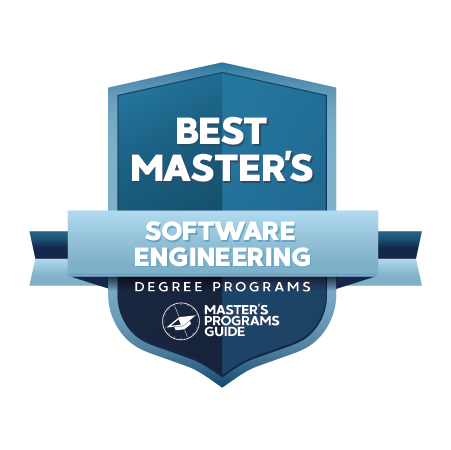Ready to find your ideal master's program?
www.mastersprogramsguide.com is an advertising-supported site. Featured or trusted partner programs and all school search, finder, or match results are for schools that compensate us. This compensation does not influence our school rankings, resource guides, or other editorially-independent information published on this site.
The software development and computer science industries are exploding. Not only are they excellent places to start and continue a career, but they don’t look to be slowing down anytime soon. Over the next 10 years, software developers and engineers will be needed in greater capacities, with a particular necessity for creators and innovators. After all, everyone uses software to one degree or another these days, whether it’s at their place of work or for their social media or device.
Those with degrees in software engineering are like craftsmen in digital spaces. Software engineers produce the programs and applications that we all enjoy or need for our day-to-day lives. But they also have a hand in government technology and in the big data corporations that are driving societal and cultural change. In a way, software engineering is the premier art of our time, and those who know how to develop and manage software projects will have a multitude of career opportunities.
While being a software developer only requires a bachelor’s degree, many are opting for graduate-level education. A master’s degree in software engineering will prepare you particularly well to work in a fast-paced and constantly evolving field of software development. Furthermore, software engineers with master’s degrees can demand higher pay and better positions in the same company.
Greater expertise means you’ll be able to handle harder projects and take command of others in the same sphere. Software development managers often have master’s degrees in the field. Because the subject requires such technical expertise, business majors aren’t as effective in these positions as they would be for other areas.
But you can also pursue a master’s in software engineering for Ph.D. studies in the future. Most of these degrees are Masters of Science, meaning they incorporate heavy research components into their curriculums. They’ll also usually have you complete a thesis, which is the first major stepping stone on your path to earning your Ph.D. Anyone looking to drive the software engineering field forward on the theoretical level will need a master’s degree in this subject to start.
However, master’s in software engineering degrees are not easy to get. Even when you take into account the rigor of their programs, most programs are highly competitive. Software engineering jobs pay well and offer great job security, so anyone with the STEM skills necessary to excel in this field will likely be jockeying for the limited positions available each year. That’s why you need to know which master’s in software engineering programs are worth your time and money.
Let’s dive deeper into this degree option, see what it offers, then find out what colleges offer the best master’s in software engineering programs around.
See Also: 10 Best Master’s in Industrial Engineering
Common Application and Admissions Questions
As with virtually all master’s level programs, a master’s in software engineering program will require that you have a bachelor’s degree before being considered for acceptance. Unlike several other program types or majors, a master’s in software engineering normally requires that all applicants have significant experience both in the software engineering field and in their prior academic education.
This means you’ll likely need a bachelor’s degree in either software engineering or another computer science field. As such, the potential prerequisite degrees you can hold before applying to a master’s program of this type are somewhat varied; as long as your prior schooling is at least tangentially related to software engineering, you’ll be considered for acceptance.
However, as with all programs, those applicants with degrees in software engineering specifically will likely be given higher priority by the admissions team of any given school. Your prior college should also be accompanied by a GPA of 3.0 or above, although a few select programs have lower minimum requirements. Meeting the minimum requirements doesn’t necessarily make you an attractive candidate, however.
Furthermore, prior work experience in software engineering is also recommended for most programs. It’s not usually necessary, but it helps to make your application stand out among the competitive crowd. Software engineering, as a STEM degree, will be flooded with qualified applicants, so anything to make your application more engaging or appealing for an admissions team is a great bonus. You’ll also likely need at least two letters of recommendation, with more letters usually helpful. These letters can come from either your former teachers or your direct superiors at your software engineering/computer science job.
Because of the need for prior experience and a degree in a related field, it’s no surprise that all master’s in software engineering programs need applicants to have a strong aptitude in both mathematics and physics. As a result, virtually all programs require students to take the GRE, or Graduate Record Examination.
This test is slightly different from the SAT or ACT in that it tests your critical thinking skills more than any other intellectual aspect. Most programs will list their GRE score threshold on their program website, allowing you to target a particular score when you sit down for the GRE. You can take the GRE up to five times in a 12 month period, so there’s ample opportunity to take the test multiple times and grab a higher score before sending in your application.
Finally, don’t forget to take the application window into account when browsing potential schools. Some software engineering programs only allow applicants for a single application window every year, while others have multiple start dates. These windows are often dictated by whether or not the program uses a cohort model (in which students accompany one another through the program in a more regimented pattern) or not. If you’re applying to schools with narrow application windows, be prepared well ahead of time to ensure that you have everything in order, as there won’t be time to correct your application after submission.
See Also: 10 Best Computer Engineering Graduate Schools
What About Financial Aid & Scholarships?
Any master’s student should begin their financial aid searching with the FAFSA, or Federal Application for Student Aid. This is also standard practice for anyone looking for a bachelor’s degree, so graduate students should already be familiar with this process. Filling out the FAFSA lets you know if you qualify for certain government-funded scholarships or grants, as well as rare subsidized loans. These can be excellent financial benefits and relieve a huge amount of the economic burden from your future schooling. Students with more economic need will be more likely to receive more help, making it one of the few financial aid options that isn’t dependent on GPA or similar metrics.
After the FAFSA, heading to the school or program’s page is the next step. Here, you can usually find software engineering related scholarships or grant opportunities that are funded by the university in question or by former alumni. The wealthy graduates of many top universities often give back to the school that helped them jumpstart their professional careers by funding scholarships and other financial aid opportunities for students. These scholarships or grants will probably be quite competitive and fiercely fought over, but it always helps to apply for as many as possible.
You can also look at software engineering related companies or organizations for potential scholarship opportunities. For instance, companies like Apple and Microsoft often provide financial aid options for future graduate students in computer science fields. These companies have a vested interest in producing new software engineering workers, so they’ll often help boost students with good grades and a bright future by providing a cash infusion. Again, these scholarship opportunities are usually competitive, but googling such scholarships with phrases like, “Apple computer science scholarship” will get you a lot of results.
Another thing to consider is the possibility of teaching assistantships or internships. Many top universities allow software engineering or other graduate students to work with one of their professors on a part-time basis, usually 20 to 25 hours per week. During this time, teaching assistants will help their professors with standard grading or organizational work and will receive a small stipend as compensation. Even better, teaching assistantships usually come with reductions in overall tuition. Internships operate similarly, though without the opportunity for actual pay during your time working for a company. Either of these options can be extremely valuable, but they’re often only offered to top-tier students in academics.
Finally, don’t forget that any active duty or former service members for the United States military (or their spouses) will often receive discounts in their tuition from the majority of universities. These can be huge financial bonuses and help you complete your schooling on a much tighter budget. Some scholarships are also only available to veterans or their families.
How Much Can I Make With a Master’s in Software Engineering?
The Bureau of Labor Statistics indicates that software developers – the main type of job that software engineering majors will hold over their professional careers – earn a median salary of about $105,590 per year. This is well over the median salary for all occupations of around $39,000 per year and even other computer occupations, around $86,000 per year. In short, software developers make lots of money and there’s tons of opportunity for rising through the ranks.
The top 10% of software developers earn over $167,000 per year—and that’s some serious cash! Even software developers on the lower end of the spectrum earn a respectable $66,740 per year. No matter what software developer position you hold, you’ll definitely be able to pay for your former schooling and save some money for retirement over time.
Other jobs requiring this degree have similar pay scales. Software publishers make about $114,000 per year, whereas software workers in the finance and insurance industries make around $108,000 yearly. Additionally, the majority of software developers work full-time or 40 hours a week and there’s lots of opportunity for overtime pay. Dedicated software developers will be able to boost their earnings even further.
However, a software developer position only requires a bachelor’s degree. A master’s degree allows you to demand higher pay from a position and take on additional responsibilities in the software field. In a nutshell, a master’s degree in this subject marks you as even more specialized than bachelor’s degree holders and enables you to take more lucrative positions in the same company.
Many managerial positions require that the position be filled with someone with a master’s degree, as graduate degrees often incorporate business or management classes depending on the subject. Some software promotions can only be earned through graduate-level education, as well.
Earning a master’s degree in software engineering is also helpful because of the job outlook. According to the BLS, software developers and related positions are projected to grow by about 21% over the next 10 years. All told, this will result in about an additional 284,000 jobs over the next decade. This means that, while the software development field is already competitive, there should be lots of room for prospective developers to earn their way to a great life. It’s a much better job environment compared to tighter fields, which are often accompanied by employers lowering salaries. It’s much better to be a skill seller in a seller’s market like this.
This growth rate dwarfs the 5% growth rate on average from all other occupations. Even general computer occupations are only growing at an additional 12% over the next 10 years. Software developers are becoming more important, as the need for new applications for smartphones and tablets is drastically increasing the demand for these positions. Indeed, the world is rapidly becoming more digital and more companies are focused on application development than ever before. Virtually every business uses computers to a great extent.
Additionally, software development is a constantly fluctuating field that’s always changing and evolving. Software developers who focus on mobile apps and code will be particularly well-positioned for new chances for success—including the possibility to create new technological developments and the opportunity to capitalize on those developments. Innovative or creative graduate students in software engineering may be able to carve out a special niche for themselves in the business. The next big software hero is likely somewhere in the next few graduating classes.
What Are the Best Master’s in Software Engineering Degrees?
We know that you have educational goals that you’re itching to pursue, but you may not know where to start. The editors of Master’s Programs Guide utilize a unique ranking methodology based on the following five aspects:
25% Overall Degree Affordability: Average cost of undergraduate and graduate tuition per school
25% Graduation Rate: Number of students who start at the university and actually finish there
20% Earnings Potential: Average mid-career salary of school alumni
20% Selectivity: The number of students who apply versus the number who actually get accepted
10% Online Graduate Offerings: The number of programs offered online in each department
At Master’s Programs Guide, we strive to do our best to guide you and your family toward a fruitful academic career. The pursuit of knowledge is a noble one, and we want to help you reach your goals.
Check out our ranking of the 20 best master’s in software engineering programs!
#1. East Carolina University
Master of Science in Software Engineering
East Carolina University is one of the most successful higher education institutions in North Carolina, with a full student body nearing 30,000. It’s among the most affordable colleges in the region, making it particularly attractive for a STEM subject like software engineering. The campus boasts beautiful architecture and stunning green spaces, along with over 500 official student clubs and organizations. Anyone enrolled here will benefit not only from a rigorous academic curriculum but also a vibrant student body and social life.
ECU currently offers the first master’s in software engineering degree in the state, both in face-to-face and online formats. It also includes several specializations to let you tailor the degree according to your interests or better prepare you for a particular job in the software engineering field. To make things better for all of its students, class sizes are typically quite small, affording each individual more time with their professor for questions or personalized educational needs.
In a nutshell, ECU’s software engineering program combines several interdisciplinary classes and focuses on preparing students to manage and create large software projects. As a graduate-level program, it’s exceptionally good for those wanting to move into management positions within the software engineering field or who want additional responsibilities as a software developer.
As a result of its emphasis on modern software development practices, many of the classes are updated regularly and professors always aim to prepare students for the professional needs of the workplaces of the future. Classes include Software Engineering; Construction, Architecture and Design; and Verification and Validation.
Over the course of the curriculum, students will gather the practical knowledge and practice needed to excel in the rapidly evolving software engineering industry. As an M.S., it’s also a suitable degree if you want to pursue graduate work afterward. This versatility makes it a great program for software engineering students that aren’t sure if they prefer a terminal degree or want something that leads to a Ph.D. Regardless of goals, each student will need to complete either a capstone project or thesis under the supervision of a faculty member.
ECU offers two pathways to entry: traditional and nontraditional. Traditional pathways are best for students who already have bachelor’s degrees in the computer science field or who have lots of experience working with information technology and software engineering. This track requires 30 semester hours for degree completion.
Meanwhile, the nontraditional pathway is best for those with bachelor’s degrees in engineering, mathematics, or similar subjects without a focus on computers or software. This program includes two additional courses during the first semester to bring students up to speed and enable them to complete the program with high grades. This pathway totals 38 semester hours to account for these additional classes.
ECU is a great choice of school for other reasons as well. Their computer science department offers several internships for software engineering degree students, providing additional work experience and networking opportunities if they have the time to spare. This could potentially make finding employment after graduation a lot easier.
#2. DePaul University
MS in Software Engineering
DePaul University is a modern and technology-oriented school, as well as the largest Catholic University in the United States. Located in the heart of Chicago, DePaul’s campus places students in the heart of a bustling metropolitan area, which is great both for student social life and for employment or networking opportunities throughout graduate school. All students benefit from class sizes of less than 40 per class (with about a 15:1 student to faculty ratio), as well as a diverse faculty base, all of whom are expert researchers in their field of study.
Their M.S. in software engineering program is designed to provide any student attending with widely applicable and highly in-demand skills in the software field. Their curriculum has an intrinsic focus on process required to excel when writing and analyzing software; many of their classes focus on current methodologies and the best modern software engineering practices. In essence, many aspects of the curriculum are concerned with teaching students how to think about software engineering rather than giving them things to memorize by rote.
Additionally, DePaul’s program includes several classes or elements that emphasize communication and presentation skills. Many software engineering positions, especially for Fortune 500 or similarly successful companies, require that all software developers be team players. The inclusion of these aspects in the curriculum means that graduates will be well-equipped to work on a larger software development team. It’s also great for preparing graduates to lead smaller teams of software engineers.
Beyond this, the curriculum incorporates many standard features and subjects, ranging from software architecture design, to software testing and quality assurance, and software maintenance.
The program’s success can’t be understated. Ninety-three percent of master’s graduates from this program were employed within six months of graduation as of 2017. This showcases the value and network opportunities inherent in this school and its academic offerings. Even better, DePaul has a vibrant research base among its faculty; software engineering faculty members at the school have been awarded over $4 million in grants over the past five years. Software engineering students looking to dive deeper into research and theory in this subject will find multiple opportunities for internships and networking.
There are start dates in every season of the year, but the program can also be completed online, as every bit of the curriculum is captured using audio and video tools. There’s no difference between the online and on-campus programs. However, even when online, students will benefit from a team-oriented education and work well with their peers through group projects. Four concentrations are available for students in this program: software development, software architecture, real-time game systems, and entrepreneurship and technology leadership. Two of these emphases are relatively unique compared to other concentrations available at other universities, making DePaul a great choice for focused software engineering students who know what they want to do for their professional careers.
#3. Stevens Institute of Technology
Master of Science in Software Engineering
Stevens Institute of Technology is a revolutionary university that’s produced fantastic graduates in the field of artificial intelligence, finance, nanotech and many more. It’s a smaller institute of higher education, with around 7000 students and 300 faculty for a student to faculty ratio of about 11:1. The campus is located right across the river from New York City, affording stunning views, many social opportunities, and several places to work after you’ve graduated. They have a relatively low acceptance rate of about 40%, but that ensures the quality and rigor of their academic programs.
Their master’s in software engineering program is ranked No. 21 for its online variants according to U.S. News and World Report. Diving deeper, we can see that the program places a big priority on teaching students how to build reliable, safe, and secure software systems for multiple kinds of industries or needs.
The curriculum teaches all students about the lifecycle process of software, granting all graduates a deeper understanding of both how software comes into the economy and how it’s eventually phased out. Additionally, all students will benefit from classes that teach them how to design, test, build, and maintain their own software systems, as well as learn to manage multiple software projects simultaneously and with great efficiency.
The student body is typically made up of learners from varied backgrounds, including business in the liberal arts along with typical subject focuses like computer science or mathematics. As a result, students will benefit from having multiple viewpoints in each classroom, helping everyone see problems from other perspectives. The curriculum already pushes concepts like software architecture, technical planning, risk management, and software assurance, all of which are valuable in the fast-paced software development market.
There’s a lot to like from the financial aid perspective, too. The National Science Foundation selects students in this master’s in software engineering program every year for funding. It’s designed to help those without lots of financial assistance to complete their education and reach their professional goals. When combined with more typical financial aid options, you should have several avenues to lighten the burden of educational debt.
The program is available in three formats: on-campus, online, and corporate. The first two options are easily understandable and comparable to most other programs across universities. The online program is also great because it’s exactly the same as the on-campus option with additional asynchronous schedule flexibility. But the corporate option enables students to continue working at their software firm or computer science position while finishing their education. The degree will be completed at a slightly slower pace, but will still have students finish with a degree by the three-year mark. This pathway also offers opportunities for certain discounts depending on where the student works. It’s a fantastic option for current software engineering workers who don’t want to give up their position at their company to get a graduate degree.
#4. Kennesaw State University
Master of Science in Software Engineering
Kennesaw State University is one of the largest public institutions in the United States and features many programs that incorporate innovative teaching approaches. Its main campuses are located northwest of metropolitan Atlanta. They feature many high-quality majors in schools ranging from nursing to management to computer science. But the school also provides its students with a fantastic campus experience across both locations in Kennesaw and Marietta. Both campuses combined take up 587 acres and include dozens of modern buildings and facilities for both academics and recreation. Over 250 student organizations ensure that the student body enjoys a vibrant Greek life and plenty of opportunities for social activity and networking.
They offer start dates for spring, summer, and fall semesters, allowing students to jump into the program whenever it works best for their unique schedules. The program itself relies heavily on real-time strategies and procedures used in the current software development market. This guarantees that all the graduates from this program will have up-to-date information and be more competitive once they dip their toes in the job market. Both online and face-to-face variations of this program are available, though the curriculums are identical. You can also do a hybrid version of this program if that works best for your schedule and you’d like some face-to-face interactions with your professors and classmates.
Each pathway is comprised of seven required courses and several electives. At the end of the program, students can complete either a thesis or an engineering capstone project. The thesis option includes three additional elective courses in conjunction with their thesis research. Additionally, the program is open to students with any bachelor’s degree, although students with an undergraduate degree in any area other than computer science must complete several foundational courses before they can move into the advanced material. Your advisor will be able to tell you how many foundational courses you’ll need to complete (up to five).
Kennesaw also provides opportunities to earn several graduate certificates in either software engineering or the foundation courses mentioned above. Certificates can make you an attractive hire for software engineering positions or allow you to obtain a computer science position in a company without earning the full degree. It’s a great additional option.
The program in total is 36 credit hours and has a slightly lower than average GPA requirement for acceptance. You should still try to make your GPA the highest possible in order to have the best chance of being accepted, of course. Once in the program, you’ll complete classes such as Software Project Planning Management, Object-Oriented Analysis and Design, and Software Testing and Verification.
Those students who’ve completed a bachelor’s degree at Kennesaw either in computer game design and development or in software engineering may have the opportunity to complete the master’s program on an accelerated basis. In less than six years, students can complete both degrees by taking several compressed or combination courses or by taking classes over summer semesters.
#5. Nova Southeastern University
Master of Science in Software Engineering
Nova Southeastern University is an institution that is rapidly gaining in reputation thanks to the quality of its programs and the success of its graduates. It features a worldwide alumni network and has a research body dedicated to preserving and investigating oceans and aquatic life. It also includes a 314-acre main campus; a virtual tour is available if you want to check out the space for yourself before applying to the program.
Their master’s in software engineering program is 36 credit hours and has a limited application window once per year, meaning anyone interested in the program should have their stuff in order well before the deadline. The program is offered both online and on-campus in South Florida, and both variations of the program contain the same focus on foundational software engineering.
In this way, it’s a lot like a natural extension of a bachelor’s degree in the same field. Classes include subjects like Software Design and Development and Software Verification Testing, and even more specialized classes like Human-Computer Interaction. This last focus will help students understand how humans interact with computers and why certain types of software are more popular than others. It’s a great class and program as a whole for those future software developers interested in user-friendly coding and creation.
Across all the courses, the program blends theory and practice so that students are well prepared for the job market upon graduation. The online program has an asynchronous format, making it ideal for those who need to work or balance a family life at the same time as they complete their education. On-campus classes meet once per week for 16 weeks in the fall and winter terms or 12 weeks in the summer term. As such, it’s a more relaxed graduate program than many accelerated options that have students complete eight-week classes.
In total, there are six core courses and six elective courses required for program completion. Unlike the vast majority of master’s programs in software engineering, neither a thesis nor a capstone project is required for completion. This may make it a favorite for students interested in a terminal degree; that is, a degree designed to help them attain a higher professional position rather than prepare them for research in the future. It’s a very digestible program that doesn’t require lots of long-term investment beyond understanding the material and completing everything on time. NSU arguably provides one of the more schedule friendly programs in this field as a result.
While NSU does accept applicants without strong backgrounds in computer science or software engineering, such applicants will be required to take one or more graduate courses during the first two terms in order to catch up on the material.
#6. Villanova University
MS in Software Engineering
Villanova University is one of the most successful universities in modern times for several reasons. For one, they have very competitive tuition rates and several sources of funding, including tuition reduction for educators. Additionally, it’s a very busy research institution; students looking to delve deeper into the theoretical field of software engineering will find many peers and professors to network with, as well as opportunities to perform their own research.
It’s also located near Philadelphia, allowing students to enjoy a bustling metropolitan life just 12 miles east of the campus. The combined suburban and city setting provides a variety of opportunities and lots of chances for networking. Students from all walks of life attend the beautiful campus, which is highly focused on renewable resources and green energy.
Their program is an M.S. in Software Engineering, marking it as a suitable degree either for terminal education or as a stepping stone to a Ph.D. As a result of its versatility, it combines both theoretical knowledge with practical know-how and experience to produce well-rounded graduates and excellent software creators. The degree as a whole requires 30 credits comprised of 10 courses, ranging from Database Systems to Software Engineering and Software Design and Evolution. The courses aren’t very specific compared to the ones offered by some other programs, but they are great for generalized software engineering and can help ready you for a wide variety of development positions.
Additionally, a thesis course must be completed unless students opt for a practicum track; this adds an additional one-credit course to the curriculum and requires work experience in a related field. Thus, students who already have a job in a software engineering position may opt for this pathway, both to graduate slightly earlier than their peers and because it’ll be a little cheaper in the long run.
However, all students will have the opportunity to undertake a Grand Challenges Project. This can be one of the last courses you take, as it builds upon the material you learned in other courses. This is basically Villanova’s spin on a capstone course, as you work independently or with guidance from an advisor on the topic that both you and the advisor have determined beforehand. This project can take the place of the thesis, be used to bolster your degree credentials or earn you notoriety within the school. It’s a great tactic if you want to proceed to a Ph.D. program in a related field, at Villanova or another school.
When it comes to finances, Villanova offers affordably priced programs for all of its majors. But even better, students can also compete for two merit-based fellowships for full-time students. These tuition scholarships and graduate assistantships provide stipends as well as tuition coverage for your program. The tuition scholarship is a little easier as it doesn’t require the work of assisting a professor, but a graduate assistantship is a little easier to earn since fewer students apply for it. Additional loans or payment plans are also available, all of which combine to make Villanova one of the more affordable schools offering a master’s in software engineering degree.
#7. University of Southern California
Master of Science in Software Engineering
The University of Southern California is one of the leading private research institutions in the entire state, and it’s well known for several reasons. It has an extremely high student retention rate of around 96% on average, with an average 92% graduation rate over six years. This speaks to both the skill and quality of the faculty along with the manageability of the academic programs. All graduates will benefit from an alumni network of 375,000 strong, with over half of alumni living in California. Beyond these benefits, students will also enjoy sunny southern California weather and close proximity to Los Angeles—a city of opportunity if ever there was one.
Their M.S. in computer science focuses on software engineering rather than being a dedicated degree in the field. This provides students with a broader foundational understanding of computer science as a whole and might be valuable for software engineering students who might want to swap career tracks in the future to something related to development. Either way, the curriculum includes education not just for software development skills but also for systems engineering as well as customer collaboration and management. It’s one of the most well-rounded degrees in the field.
Indeed, many of its courses focus on emerging trends like software-intensive systems or COTS integration. Students who take courses here will be up-to-date on modern software development and engineering trends or topics. This will make them more attractive hires and help them integrate into a workplace environment relatively easily. Even better, most of the classes incorporate real client case class projects or evaluation assignments. Students will get hands-on opportunities to try out their software engineering skills and see how current engineers handle the problems they’ll be facing when they’re in the workforce.
Ultimately, the curriculum prepares students for industrial leadership careers in the software engineering field. But beyond its value as a terminal degree, it can also help students who want to pursue advanced research leading to a Ph.D. There’s no cumulative examination required for graduation, and the curriculum as a whole is 32 credits. Students will have to complete some directed research in their last semester, though this is not necessarily focused around a research paper the same way a thesis would.
USC does include a thesis program option for those interested, of course. Anyone interested in a Ph.D. program would be wise to take this pathway. Furthermore, particularly advanced or academically successful students can apply for the honors program. This highly selective opportunity allows a student to apply for a teaching assistantship position (with an associated stipend and tuition coverage) as well as multiple extra opportunities to meet with faculty and Ph.D. students at social events.
These honor students will even be able to participate in research presentations and selective career fair activities; it’s no stretch to say that those in the honors program will benefit from many more advantages compared to their regular classmates. Even early class registration is included as a perk!
If you don’t get into the honors program, you can also benefit from occasional internship opportunities. These are often for nearby companies or for groups at USC itself, but they can offer you great chances to network or possible employment opportunities after graduation.
#8. Auburn University
Master of Science – Computer Science and Software Engineering
Auburn University was originally founded in 1856 as a male-only college but has evolved into an interdisciplinary and diverse institution with a large campus totaling over 1800 acres. It features a low student to faculty ratio of about 19:1, as well as over 300 student clubs and organizations that any student can join. A well-developed international presence also allows Auburn to provide students with international studying opportunities and is part of why the school has such a diverse, experienced faculty body.
Their M.S. is in both computer science and software engineering, and the curriculum reflects both this focus on general computer science knowledge and more specialized classes. It’s also available online, with both programs including traditional instructional and research-oriented classes. On-campus students have a little more flexibility as they can choose either a thesis or non-thesis option, allowing them to pursue Ph.D. studies in the future. Online students can only complete the non-thesis pathway unless they receive special permission from the school’s computer science department. Each path is 30 semester hours regardless of whether the student pursues a thesis.
Both on-campus and online students will be able to specialize in several concentrations, including computer networks, artificial intelligence, cybersecurity, machine learning, human-computer interaction, or databases and data science. This wide variety of class options allows students to tailor the degree according to their interests and really make it their own. Auburn’s enjoyment of variety is also reflected in their encouragement that applicants with degrees in other fields apply to the program, even if acceptance is offered on a case-by-case basis.
One final bonus that online students can enjoy is that GRE requirements are waived for that path. Only on-campus students must take the GRE and meet a certain score threshold.
Auburn also provides opportunities to earn several different engineering certificates, which may be valuable depending on the position you want to hold in your company or future career. Graduate certificates span subjects like automotive manufacturing systems to cybersecurity engineering to power engineering. These can also be combined with a specialized degree. In total, Auburn students have lots of ways to make their own mark and control their educational destiny.
Auburn’s engineering school has an alumni network of over 40,000 engineering graduates that currently span the globe. This alumni network is arguably one of the best advantages in the whole university, as future graduates will be able to network and rely on this collection of professionals for employment opportunities or possibly even grants.
#9. Carnegie Mellon University
Master of Science in Software Engineering
Carnegie Mellon University is one of the most world-renowned private research universities. Many of its alumni have won Nobel or Turing prizes or created innovative technologies like driverless cars. With over 14,000 students and 1300 faculty, there are plenty of diverse viewpoints to encourage original thinking, but not enough students that students feel crowded while in a classroom. In fact, Carnegie Mellon is ranked as No. 1 among computer science schools according to U.S. News and World Report.
Their program is designed from the ground up to create the next wave of top-tier software engineers and developers as well as technical project leaders and software development managers. The curriculum deliberately mirrors the energy and adaptability of Silicon Valley’s software industry. As a result, many of the classes and general research attitudes reflect product development and a focus on what works for people.
The M.S. in software engineering program includes a rigorous foundation in the principles of software engineering in relation to general computer engineering. As a result, graduates will come out with an understanding of both the software and hardware aspects of development, more balanced than other software engineering graduates.
The class list is interestingly varied and diverse, covering subjects like Mobile Computing, Related Domains, and Connected Embedded Systems. Most of the faculty teaching the subjects also perform research in those fields, allowing students interested in pursuing a Ph.D.-level education to get their start at this university with the faculty as their tutors. While several classes focus on things like cyber-physical systems or machine learning, most of the courses focus on software engineering.
Many of the classes will also incorporate team learning or collaborative elements. Many software developers must work on teams in order to complete projects on time, so several of the classes in this curriculum reflects this necessity. You’ll often complete group projects for a single grade, which tests your communication and leadership skills.
Additionally, Carnegie Mellon includes many deep ties to local or international software companies, like Google, Apple, or even Facebook and Microsoft. Indeed, one of Carnegie Mellon’s greatest bonuses for all students is that they can participate in Silicon Valley culture through many sponsored projects, internships, hackathons, and more.
If you’ve been looking to get into software development and engineering in the same way that Mark Zuckerberg did, there are few schools as appropriate for that goal than this one. The curriculum is specifically integrated alongside networking opportunities to help students find employment after graduation and maximize their chances for innovation and success.
Many of Carnegie Mellon’s graduates are consistently recruited by small and large companies alike. It’s no wonder that the majority of their alum end up having a job less than six months after graduation, if they weren’t already hired while in school. The ultimate value of this program lies in its competitive academic rigor and the access it gives to so many different employment avenues.
Of course, all these benefits come with strict admissions requirements. In addition to high test scores and a degree in computer science or related field, Carnegie Mellon also demands that all students have familiarity with software development technologies, as well as several programming languages and other computer science methods or standards. The class listings are always competitive, and spots are limited, so anyone interested in the school should apply as early as possible and with as robust a portfolio as they can manage.
#10. North Dakota State University
Master of Science in Software Engineering
North Dakota State University is a land-grant research university that’s one of the highest performing in several areas including agricultural sciences and computer sciences. The main campus is located in Fargo, North Dakota, and residents of North Dakota can enjoy extremely affordable tuition rates. All students regardless of origin will benefit from a low student to faculty ratio of 16:1. Even better, the college is located on a large campus with beautiful scenery and several high-quality research institutions. Recreational facilities and outdoor sports dominate the social side of things, and most of the school gets together for football games every year. Ultimately, it’s a great school both for its student life and the ultimate quality and rigor of its academic programs.
This software engineering program dives straight into the nitty-gritty details of the field, emphasizing the application of quantifiable and systematic approaches to the development and maintenance of software systems. While many of its classes include computer programming, the curriculum goes beyond the basics by a long shot.
Classes will include modern tools and technologies that help you learn to manage the entire software lifecycle. You’ll learn about the development of software requirements and specifications, along with proper design and testing routines. Even project development and management are included in the skills you can expect from this curriculum.
The classes tend to be fairly specific, covering topics like Software Construction or Software Complexity Metrics. You’ll also have to complete a graduate seminar in various software engineering areas, each of which will be approved by your advisor. These seminars allow you to complete projects and collaborate with your fellow students, gaining valuable real-world working experience.
Furthermore, students can pursue a specialization in cybersecurity. This involves taking nine credits from a list of electives and includes classes like Computer Crime and Forensics or Network Security. At the end of the curriculum, students will either complete a thesis or a comprehensive study paper based on a significant software development project. It’s essentially a capstone project with a little more writing, but it must be approved by your advisor in the same way. Those interested in pursuing a doctorate will want to pursue the thesis pathway.
Additionally, any students in related programs can pursue a graduate certificate in software engineering. This may allow you to obtain a software engineering or development post at a company if you have a related degree, like general computer science or programming.
Regardless of goals, all students interested in this program will want to get their portfolio together in preparation for only two application deadlines each year. There is no summer semester, extending the program a little because students can’t take summer classes. Application requirements are fairly intense, with a relatively low GPA minimum (though 3.0 or above will still be needed for most accepted applicants). But they also require a specialty in a specific programming skill and a bachelor’s degree in computer science or related field.
Other Notable Programs
#11. University of California-Irvine
Location: Irvine, California
Degree: Master of Science in Software Engineering
Net Price: $15,014
#12. Illinois Institute of Technology
Location: Chicago, Illinois
Degree: Master of Computer Science with an Emphasis in Software Engineering
Net Price: $25,814
#13. Rose-Hulman Institute of Technology
Location: Terre Haute, Indiana
Degree: Master of Science in Software Engineering
Net Price: $44,063
#14. The University of Alabama in Huntsville
Location: Huntsville, Alabama
Degree: Master of Science in Software Engineering
Net Price: $15,437
#15. Mercer University
Location: Macon, Georgia
Degree: Master of Science in Software Engineering
Net Price: $21,202
#16. Arizona State University-Tempe
Location: Tempe, Arizona
Degree: Master of Science in Software Engineering
Net Price: $13,731
#17. Southern Methodist University
Location: Dallas, Texas
Degree: Master of Science in Software Engineering
Net Price: $38,562
#18. Florida Institute of Technology
Location: Melbourne, Florida
Degree: M.S. in Software Engineering
Net Price: $34,139
#19. Drexel University
Location: Philadelphia, Pennsylvania
Degree: M.S. in Software Engineering
Net Price: $36,727
#20. Regis University
Location: Denver, Colorado
Degree: M.S. in Software Engineering
Net Price: $26,273
IF YOU ENJOYED THAT THEN CHECK OUT OUR ARTICLES ON THE 50 MOST POPULAR ONLINE MASTER’S DEGREES & THE TOP 10 REASONS TO EARN YOUR MASTER’S DEGREE!










